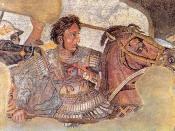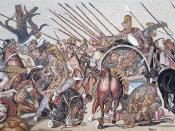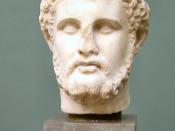Alexander the Great is, arguably, the most famous secular figure in history. His magnetism in life was rivaled only by his magnetism in death, and the story of his career has evoked vastly different interpretations in his age and ours. Young romantic hero or megalomaniac villain? Alexander III of Macedon conquered all who stood before him, but usually in order to free the lower class. He did more to spread the Hellenistic culture than anyone before or after him. My credibility comes from much studying of his lifestyle, and analysis of many contradicting biographies. With this speech, I hope to display to you most of his feats and battles, as well as the vast quantity of folklore that surrounds his life.
Alexander, was born on or around July 20, 356 BCE, in Pella. The exact date may have been created after the fact to match the date of the burning of the Temple of Artemis at Ephesus.
His parents were Philip II of Macedon and Olympias, who descended from Gods according to myth. At 13, Aristotle was hired to tutor Alexander. Under Aristotle, Alexander learned philosophy, ethics, politics, and healing. The two later became estranged, due to their difference of opinion on the status of foreginers; Aristotle saw them as barbarians, while Alexander sought to merge Macedonians and foreigners.
At 14 Alexander surprised all including his father by mounting an untamable horse named Bucephalus. Alexander would later name a city after the site where his horse died in battle.
During 340 BC, Philip II traveled to Byzantium to battle rebels, leaving 16yr old Alexander in charge as Prince Regent. While away, the Maedi, a north Macedonia tribe, revolted. Alexander traveled there, put down the revolt, captured the city and renamed it Alexandropolis.
At the age of 19, Philip II was...


